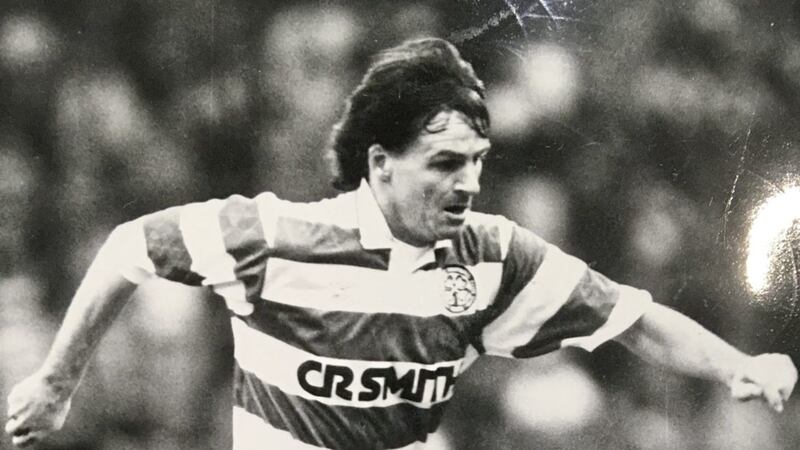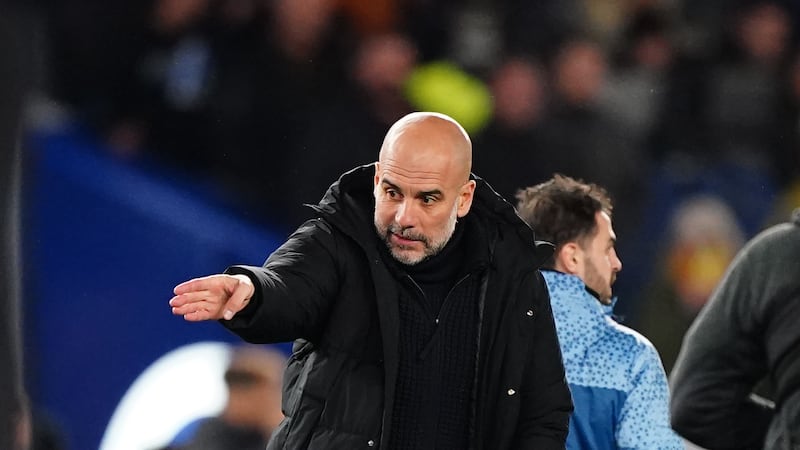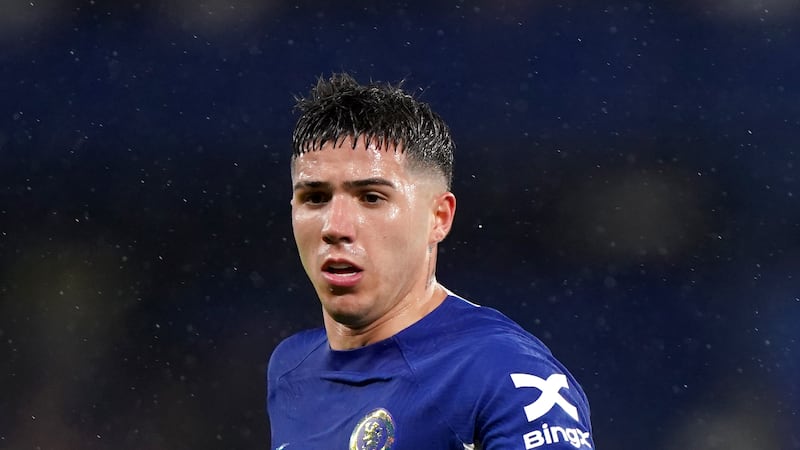DO you remember Charlie Nicholas? I asked.
‘Oh aye, Champagne Charlie…’ replies the Celtic fan.
The ‘champagne’ tag has stuck, but even back in the 1980s you couldn’t buy champers for a fiver.
Charlie Nicholas wasn’t interested in bubbly when his career began and he turned down big money offers from English clubs to sign with Celtic for five quid a week.
He’d make up for that later (and you can’t blame a footloose young fella for that) but early on Charlie just wanted to score goals for the Hoops and that’s exactly he did. By the bagful.
Dropped into Glasgow right, bang, smack in the middle of the Lisbon Lions’ heyday, Nicholas grew up to be a skilful, two-footed, instinctive finisher. He graduated from the Parkhead terrace to the pitch and became an idol of fans who embraced him as one of their own.
Born in in the now demolished city centre district of Cowcaddens, young Charlie was brought up in the Maryhill suburbs. His mother, a home help, had been brought up a Protestant but converted to Catholicism when she married his dad, a printer and a Celtic devotee.
His dad first took his hand and led him to Celtic Park at the age of six during the golden age of Glasgow football.
“I remember the Lions,” says Charlie, now a popular pundit on Sky Sports’ Soccer Saturday.
“I was there the night they brought home the European Cup and paraded it at Celtic Park – they had an old truck dressed up with a couple of ribbons here and there and a couple of banners.
“I was very lucky to see that time and catch that exciting European feeling we always got.
“Rangers were strong then as well and there was a lovely dynamic in the city of hatred and passion and commitment to each other but at the same time, and they’ll never admit it being Glaswegians, but there was a respect of each other.”
The abiding football memory of his youth is the 1970 European Cup semi-final against English champions Leeds United. A swaying, singing sea of humanity crammed into Hampden Park to watch the Hoops win 2-1 on a night when the Glasgow air was thick with the hopes and dreams of 136,505 fans.
“It was one of the greatest things I’ve ever witnessed,” says Charlie.
“It was that packed you couldn’t see the walkway and we ended up on a corrugated roof at the back of the terrace. The only way I could see was up on my dad’s shoulders.”
Bobby Murdock got the winner to send Celtic through to another European Cup final and young Charlie went to bed dreaming of wearing the green and white jersey himself one day.
His first step was Celtic Boys’ Club and a little white lie got him picked out of a herd of hopefuls.
“One of my uncles got me a trial when I was 12,” he explains.
“I was always a right-midfielder and there was 40 of us at this trial and you had to give your name and your position.
“Everybody was saying ‘inside-right’ so by the time they came to me I just said ‘inside-left’ and I ended up getting picked there.”
He was (unbelievably for a man who scored 48 goals in a single season) a sweeper for a while but had gravitated to centre-forward for the Celtic U16 team by the time offers had come for trials south of the border.
He went to Bobby Robson’s Ipswich Town and was impressing at Wolves when Celtic manager Jock Stein sent word to get him on the first train back to Glasgow.
“That was it, my Celtic career began,” he says.
“Once I heard they were going to sign me that was it for me and also for my family, for my father.”
Ipswich had offered him £150 a week, Wolves offered him the same, but he signed for Celtic for £5.
“I’m not very business-minded,” he says with a giggle.
“It was heart over head, of course it was. The sensible choice was to take the money and go to England and see where you go from there.”
With the forms at Celtic signed, Nicholas was offered an apprenticeship as a car mechanic at a Citroen franchise owned by world champion boxer (and Rangers fan) Jim Watt. Under instruction from his mother, he got overalls on and went to work.
For a while he tried to be a jack of both trades, but he could only master one. He says he nearly blew up “two seven grand cars” in his first week as a mechanic and luckily Billy McNeill (who had tried to sign him for Aberdeen the previous season) replaced Stein as manager at Celtic and young Charlie was soon part of his plans.
“Billy knew my boss at the garage, who had already realised that my mechanical skills were very limited,” Nicholas explains.
“I went in for a week and then Billy turned up at our house and told my mum: ‘Look I know you’re worried about your boy, I know he’s doing an apprenticeship, but he’s going to be a star footballer, go along with me, trust me, this is the way he should go’.
“My mum calmed down a bit, my dad was as proud as punch and that was me. I did three months putting the gear up for the first team and cleaning the boots, then they moved me into the reserves and within six months I was on the bench for the first team.
“It was all quite dramatic. I didn’t know at the time but Celtic were struggling a little bit and Danny McGrain was pushing my name. At 17 I was in the first team.”
Nicholas describes McGrain, the legendary full-back, as “my ultimate friend” and with his endorsement and a ton of goals for the Celtic reserves, he made his first team debut on August 14, 1979 in a Glasgow Cup tie against Queens Park. He scored the second goal in a 3-1 win.
The following season he burst on the scene in a scoring blitz that paved the way for his Old Firm debut at Ibrox.
“It was awful,” he says of a game Celtic lost 3-0.
“I got caught up in the whole emotion of the day and forgot about how to play.
“I was substituted after 65 minutes, I just had an absolute nightmare.
“It just swamped me, the whole occasion… When the ball went left, I was going right – it’s just one of the things you can’t work out.”
But by the time the Glasgow giants met again on a cold and misty February afternoon at Parkhead, Nicholas had his nerves, and the ball, under control.
“I was out doing my warm-up and I couldn’t take my eyes off the fans and the noise,” he remembers.
“Danny McGrain told me: ‘You need to forget that, you’ve got to go into your zone and get involved in where you’re going to be and how you’re going to help the team.”
Rangers were a goal up when the ball broke to him.
Commentator: ‘Provan…Sullivan…(crowd roars)… Charlie Nicholas gets his first goal against Rangers and look at the delight on his face…’
Like all top strikers, he had that God-given knack of knowing where to be. Watching the YouTube highlights now, you barely notice him in the box until he stabs the ball into the net and races away, fists in the air, on an adrenalin-driven joyous loop from the Rangers goal to the Celtic bench and there’s an early hint of the knees-up celebration that became his signature.
“I just felt ‘it can’t get any better than this’,” he says.
“You feel like you’ve won the biggest award that was ever going to be given out.
“But the thing with me was I went home to Maryhill, which was very mixed, and a lot of our neighbours were shaking my hand and applauding me saying ‘We don’t like you for it (scoring against Rangers), but that’s what it is’. I always had that to keep my feet on the ground.”
He stayed close to his roots for five goal-filled seasons, recovering from a broken leg to score 48 times in the 1982/83 season. By the end of it Liverpool, Manchester United, Spurs, Arsenal and Inter Milan were all jostling to sign him.
Kenny Dalglish, his all-time hero, and Graeme Souness – both international team-mates by that stage – were “hounding” him to join them at Anfield, but Nicholas had reservations.
“I spoke to ‘the king’ (Dalglish) and I said: “King, look, you are champions of Europe, you’re the best team on the planet, how the hell am I gonna move Ian Rush out of the team? I play for Celtic every week, so I ain’t going there to sit on the bench.
“He says: ‘Don’t you worry about that. You’ll be playing up front with Rushie and I’ll play slightly behind.
“I said: “How can you change your system when you are the best team in the world?’
“I had confidence in myself, but Liverpool were famous for signing players who sat on the bench and couldn’t get in the team.
“Do I regret it? Well, I missed out on three European Cups, three FA Cups, four league titles and two league cups so I’m only about 12 medals down! Absolutely, I should have joined Liverpool, 100 per cent.”
His choice was ‘boring, boring’ Arsenal. Their style didn’t suit him and he admits he found the football hard and took his time to settle in London.
“I’ll never be critical of Arsenal,” he insists.
“They were trying to build a more creative team but it was hard, I found it really difficult. I found London hard even though I was a proper single lad and made the best of it.”
At least he had “a few shekels” in his pockets. He went from £90 a week at Celtic to virtually two grand at Arsenal. Sometimes he didn’t have any pockets though.
“I was in the magazines doing daft photoshoots wearing a pair of knickers with Page 3 girls,” he says with a laugh (his daughters still slag him off about those pictures).
“I was a single guy, so I thought ‘why not’?
“I thought I was a superstar but I ended up being good friends socially with George Best. I used to meet up with him occasionally when he was up for it and this club called ‘Blondes’ opened and George was head honcho.
“I’ve never been in somebody’s company who had such a superstar aura. People didn’t know who I was sitting next to George Best and what a shy, humble guy he was. I loved being in his company, he wasn’t an overly chatty man but he was fussy about who he would sit and talk to and I always felt privileged. He was a true superstar.”
After five seasons at Arsenal, Charlie returned to Scotland with Aberdeen and returned to Celtic before finishing with a season at Clyde. Those nights doing the London bars with Bestie and Page 3 stunners is where he got the ‘Champagne Charlie’ tag then? No, actually it came from his early days at Celtic.
“When I first got into the team, there was a competition and the first person to score 30 goals in the Scottish league got 20 cases of champagne,” he explains.
“I won it and the headline was ‘Champagne Charlie’ – it’s not a particularly difficult nickname to give somebody called Charlie!”
On the advice of McGrain, he gave it all away. His team-mates got a case each and the management and coaches too. But the nickname stuck and the following Saturday he was out celebrating another hat-trick when “this punter” with an axe to grind approached him.
“Oh, Champagne Charlie….,” he says.
“You’re Billy big bollox… You’ve got all the money, but you cannae do this and he orders a bottle of champagne and starts drinking out of the bottle.
“I says to him: ‘Aye, but you cannae do this’. I had a twenty pound note in my pocket so I ripped it up and threw it in front of him and walked away.”
I laughed when he tells that, but inside I’m thinking it’s a bit flash for my liking.
Then he adds the punchline: “He was done and he left me five minutes later, so I ran back up to the bar to get it and stick it back together. Sure I was only on 90 quid a week…”
Oh aye, Champagne Charlie.






